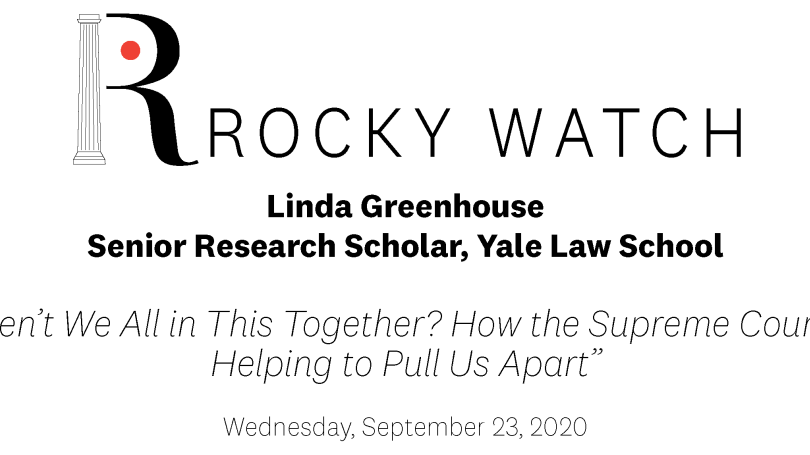
- Public Policy
- Leadership
- Funding
- News & Events
- About the Center
Back to Top Nav
Back to Top Nav
Back to Top Nav
Back to Top Nav
On Wednesday, September 23, 2020 Linda Greenhouse, The New York Times Supreme Court correspondent from 1978-2007, spoke with Dartmouth students and community members for the Rockefeller Center’s Constitution Day Lecture. Rocky Watch is a weekly series of live broadcasts that foster a virtual common space for community discussion in this time of social distancing and remote learning.
Greenhouse’s lecture explored important Supreme Court cases that demonstrate how the court increasingly interprets the law in a way that privileges the views of the individual over the well-being of society at large. The lecture was delivered in the aftermath of the death of Supreme Court Justice Ruth Bader Ginsburg, and, with the Court’s makeup about to be shaped for decades to come, Greenhouse’s words could not have been timelier.
Greenhouse began the lecture with the observation that all too often the “Supreme Court comes to us in soundbites or the ultimate judgement.” When it comes to truly understanding the Court, however, the “devil is in the details.” Thus, in the spirit of Constitution Day, Greenhouse explained a handful of cases that illustrate the intimidating challenges the United States is currently facing. Specifically, Greenhouse worries that the Supreme Court is “contributing to the fracture of community” and the “erosion of civil society.”
First, Greenhouse examined Abood v. Detroit Board of Education, a 1977 labor law case in which the Supreme Court upheld the maintaining of a union shop in a public workplace. In essence, the decision required employees to pay union fees even if they disagreed, on First Amendment grounds, with the union’s political activities. The Court wanted to avoid a situation in which employees could “free ride", not paying their “fair share for [union] benefits that everyone sees.” Recognizing the importance of unions and hoping to prevent free riding, the Court determined that requiring employees to pay union fees was constitutionally justified because the health of unions was important to labor relations as a whole.
However, societally oriented decisions like Abood have been supplanted by individual ‘conscience claims’ in the Court’s more recent decades. To prove this, Greenhouse fast forwards to decisions made by the Court in recent years in which employers and employees alike have been able to opt out of providing services on First Amendment, conscience grounds. Greenhouse notes that “these decisions are celebrated in many quarters as symbols of America’s commitment to civil society” and to “freedom of conscience.” But today, Greenhouse argues, the overuse of conscience claims has “become a threat to civil society.”
This argument brought Greenhouse to the second important case of the lecture, Jannis v. American Federation of State County and Municipal Employees (AFSCME), a landmark 2018 decision by the Supreme Court. In the decision, the Court ruled that union fees in the public sector violated the First Amendment right to free speech, overturning Abood v. Detroit Board of Education. Greenhouse draws a number of lessons from the overturning of Abood by Jannis, importantly, that First Amendment conscience claims have become a “potent tool of deregulation” and that “no precedent is safe.”
Next, Greenhouse emphasized that “overturning Abood was a project of Samuel Alito.” Justice Alito had, over the previous decade, waged a campaign against Abood, writing majority opinions that provided activists a foundation through which to bring more cases to the Court to weaken the 1977 ruling. It was clear that Abood would be overturned by 2016, and once Justice Gorsuch was appointed to the Court in 2017, the stage was set for the Jannis v. AFSCME decision.
This extended attack on Abood, Greenhouse believes, ties directly back to her claim at the start of the lecture: The Court is threatening the foundation of civil society. “The primary injury” of elevating the conscience of the individual over the well-being of the collective in the overturning of Abood, Greenhouse says, “is to further constitutionalize the notion that we as a society are not in fact united in a common cause.”
Greenhouse recognizes a similar legal phenomenon tracing back to the 1993 Religious Freedom Restoration Act, which states that the “Government shall not substantially burden a person’s exercise of religion even if the burden results from a rule of general applicability.” Of course, Greenhouse says, this raises the question: “what amounts to a substantial burden?” Unsurprisingly, the broad language of the Religious Freedom Restoration Act has been used to support conscience claims put forward in cases like Burwell v. Hobby Lobby, which struck down the contraceptive mandate of the Affordable Care Act. In cases like this, Greenhouse believes the Court continues to allow companies and individuals to opt out of their social obligation on conscience grounds.
With that in mind, Greenhouse leaves the Rockefeller Center on an ominous note: The Supreme Court has in recent decades become a “tool that individuals can invoke to free themselves from the bonds of joint enterprise.”
Written by Ben Vagle ’22, Rockefeller Center Student Program Assistant for Public Programs
Rocky Talk Podcast w/ Linda Greenhouse: Apple Podcasts and Spotify.